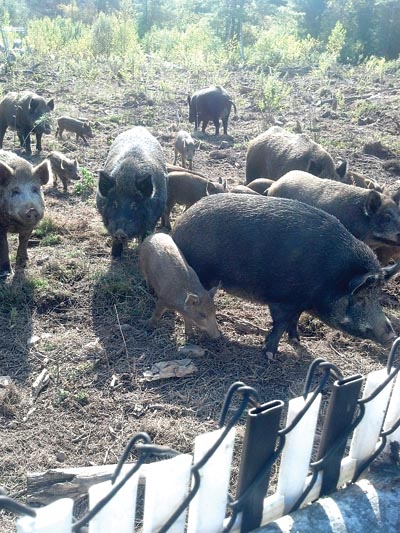|

|
Contributed Photo
This image provided by Bethel Supervisor Dan Sturm shows what appear to be Eurasian boars of varying ages in enclosures off Goldsmith Road in Bethel. Sturm took the picture on his cellphone last week when town officials visited the site.
|
Boars are back in Bethel
Story by Dan Hust
BETHEL — October 1, 2013 — The boars are back.
Bethel Supervisor Dan Sturm confirmed it with his own eyes – and cellphone, which took pictures last week of what he says was between 30 and 40 feral pigs kept in pens along Goldsmith Road in Bethel.
“That property has had boars on it in the past, and they have returned,” Sturm told the Democrat late last week.
Town officials, including Sturm, visited the site September 23 after a complaint from a neighbor, who allegedly saw some of the wild boars running free.
They found the pigs behind fencing but did not find any people to talk to, he related.
The property in question was the focus of a similar investigation more than a year ago. Called Pond Ridge Hunts, the acreage was being used to house and breed Eurasian boars, which would then be shipped to a preserve near Long Eddy to be hunted for sport.
For a while, there were no pig sightings, leading residents and officials to assume the animals were gone.
The owner of Pond Ridge, Zbyszek Trunirz, could not be reached for comment, though last year he told the Democrat he had had no complaints from neighbors about his pigs running free.
While keeping and hunting the animals is legal, the state and feds don’t want them around, and a bill is pending in Albany to ban the importation and possession of the creatures outright.
“The invasive Eurasian boar ... is new to the New York landscape, represents the greatest threat to NY and has the potential to become permanently established if action is not taken immediately,” says the NYS Dept. of Environmental Conservation’s (DEC’s) website, on a page devoted to Eurasian boars.
The DEC says the pigs compete with native wildlife for food, eat the ground nests and eggs of birds and reptiles, kill and eat fawns and young domestic livestock, consume crops and tree seeds, destroy vegetation by rooting and wallowing, can be aggressive, and can carry diseases harmful to both humans and animals.
“The DEC’s goal is to eliminate feral swine from New York State,” affirms U.S. Department of Agriculture (USDA) Wildlife Disease Biologist Justin Gansowski, who’s working with the DEC to monitor and address human-pig encounters.
The USDA is leading the effort to find any free-roaming wild boars in Sullivan County. In the past few weeks, Gansowski says he’s only received two or three reports.
“We haven’t really found anything ourselves yet,” he notes. “That doesn’t mean they’re not there.”
Overall, there’s less than 1,000 such pigs in the entire state, he estimated, but whenever the USDA or DEC find ones loose, they are killed and tested for disease.
“Our goal is to manage these human-wildlife contacts and remove feral swine from New York State,” he explained.
Anyone who sights such a pig is encouraged to call the USDA at 518-477-4837. According to the DEC’s website, the boars “usually appear hairy. They are most often dark black or brown, often grizzled with gray. Piglets are lighter in color with brown and tan stripes. The stripes disappear as they get older and darker in color. They usually have a long, straight, narrow snout, a long, straight tail with a tuft at the end and erect hairy ears. Some have a ‘mane’ of hair that stands up along the ridge of their back (‘razorback’). Many have large, prominent tusks.”
People possessing small game hunting licenses in New York can legally shoot the animals, though standard prohibitions on discharging a gun remain in force (including keeping at least 500 feet away from buildings).
Reportedly, about two dozen have been shot along the Sullivan/Delaware county border in the last two months.
Hunters, however, are discouraged from actively seeking out free-roaming boars. For one, the pigs can carry diseases easily transmitted to humans if care is not taken after they’re killed.
Additionally, wild boars are prolific breeders, and past experience has shown that when chased, they effectively scatter, ultimately having the effect of increasing the swine population and resulting impacts because they’ve been pushed into new territory.
In the meantime, Bethel officials are considering what to do about the pigs they saw on Goldsmith Road.
“It’s in the hands of the town attorney at this point,” said Sturm, who indicated that the property owner will likely face some code violations unrelated directly to the animals.
As for the pigs themselves, Sturm admitted the town probably can’t force their removal, though he welcomes calls from those who’ve sighted the swine, in order to keep track of the situation.
“We don’t want them here,” he affirmed.
|




